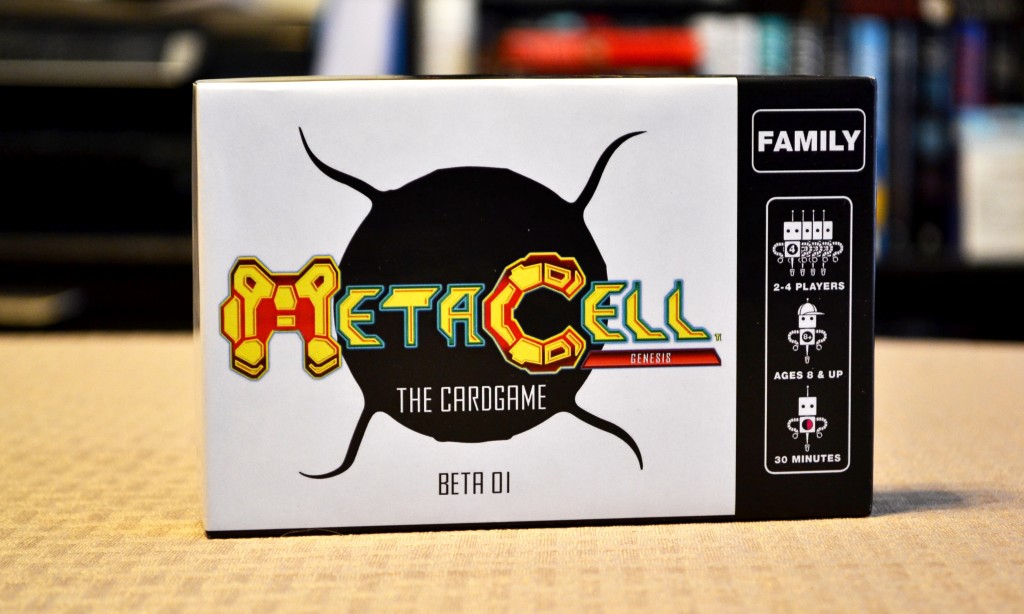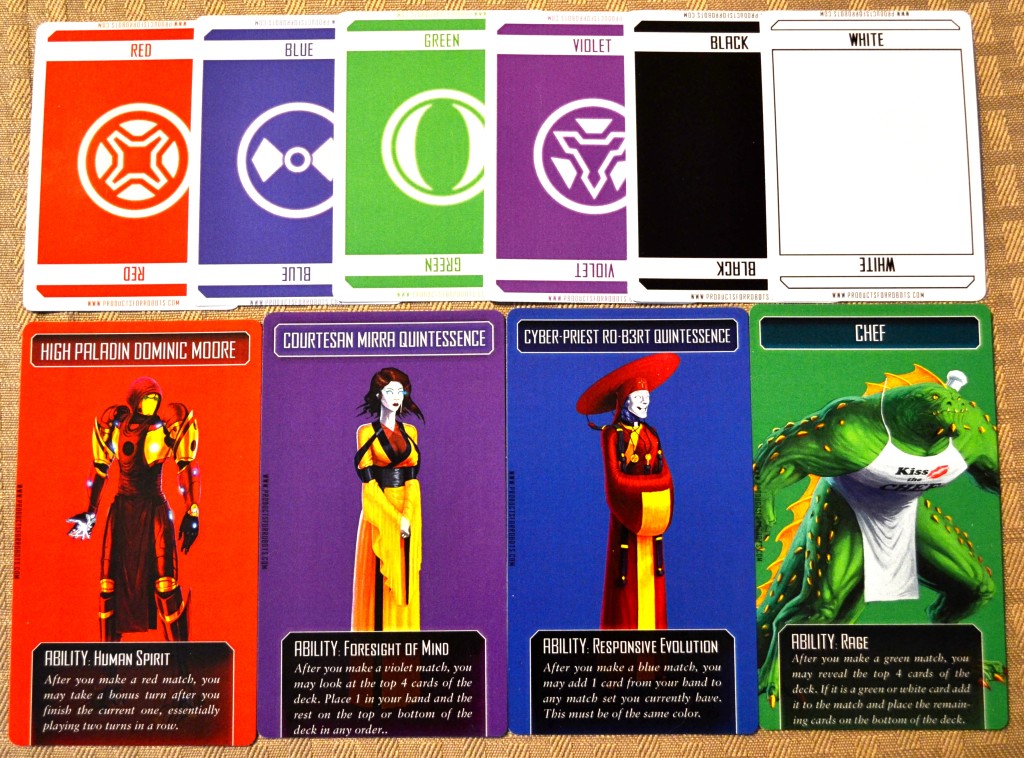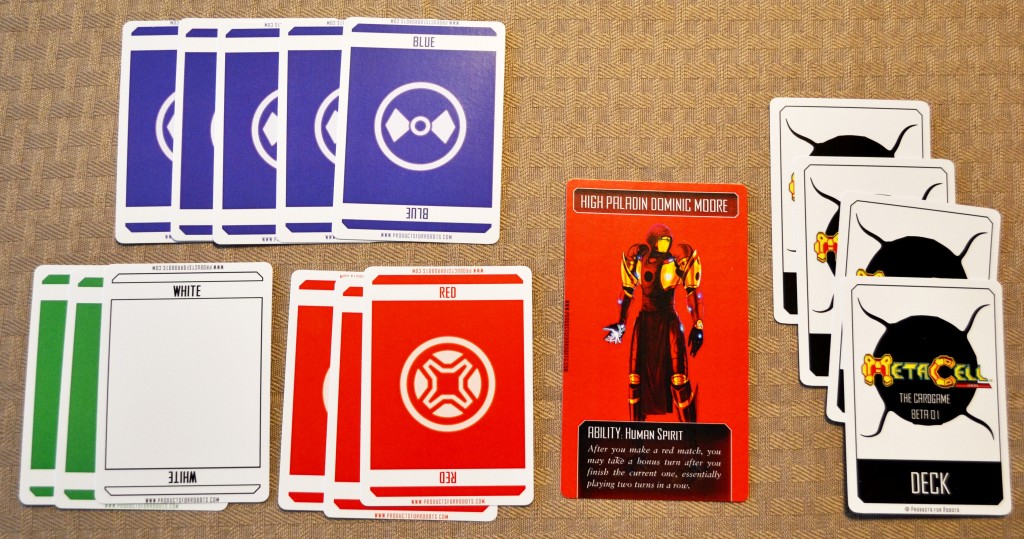With a name like “Metacell: Genesis, The Card Game”, you might immediately think that this game is complicated…not so. In fact, if I had to compare it to other card games I’ve played, I’d have to say that it was a cross between “Uno” and “Rummy”. All in all, this isn’t a bad pairing. Your objective here will be to match like-colored cards in order to score points, though the game includes some twists that help to make things a bit more strategic. Before we begin with the preview, I’d like to thank Ian Terry from Products for Robots, Inc. for reaching out and providing me with a press copy. It’s important to note that the game is currently seeking funding through the Kickstarter process (as of 4/23/14), making everything featured in this article subject to change.
My prototype copy came with a total of ninety cards that consists of eighteen red cards, eighteen green cards, eighteen blue cards, eighteen purple cards, nine white cards, and nine black cards. The white cards serve as wild cards, which can be either red, green, blue, or purple (never black). The black cards serve as attack cards that “kill” a card in the enemy’s scoring area, removing it from play. There were also four separate character cards, each with a unique color (red, green, blue, or purple) and special ability. These special abilities are activated when players play/match cards of their own color, which I’ll get to a little later. Suffice it to say that these abilities may change the way players behave throughout the game.
Setting up the game is fairly simple. Players will begin by randomly determining a starting player via “Rock-Paper-Scissors”, by seeing who has the best howling R2-D2 impersonation, or what have you. Each player will get seven cards from the shuffled deck to form their starting hand and then pick a random face down character card in turn, beginning with the starting player. Players are free to reveal their characters to other players, just so that everyone is aware of what kind of abilities are in play for that game. It’s worth noting at this point that there are a few different game modes: Dual, Mexican Standoff, Team, and Free-For-All, though they all play roughly the same way.
At the start of a player’s turn, they’ll simply draw a card from the deck. A player can do one of three things on their turn: 1) Play a black card, 2) Lay down a set of three or more cards of the same color, or 3) Do nothing. When playing a set, the cards are placed face up in front of you. This area serves as a score pile of sorts and its important that these matches remain separated by color for endgame scoring purposes. Playing a set of your color activates your special ability (as listed on the character card) and is resolved appropriately.
Playing a black card won’t allow you to play a set for that turn, but can serve to take away points from your opponent (the importance of which I’ll touch on later). To play a black card, you simply discard it along with another card from your opponent’s score area. Doing nothing on your turn is an option as well, but you probably won’t have to do this until you begin running low on cards. Like in “Uno” and “Rummy”, you may need to draw cards until you get the combination you need to go out. The character’s special abilities may even help to facilitate this process, if you plan ahead and play your cards right. Once a player’s hand equals zero or if a player cannot draw a card, the game is immediately over and points are tallied to determine the winner.
Points are handled a bit differently in “Metacell: Genesis, The Card Game” when compared to “Uno” and “Rummy”. Once the game has ended, points are totaled on a per set basis…that is, the number of cards in a set determine how many points were scored for that set. The more cards in a particular set, the more it is worth. A set of three, for example, is three points whereas a set of six is worth ten points. It’s very similar to the scoring system in “Ticket to Ride”, if you’ve ever had the pleasure of playing that tabletop game. Interestingly enough, there are point values for a set of one and two (zero and one point, respectively). These are where those dreaded black cards come into play, effectively reducing the worth of a small set to nearly nothing while knocking down larger sets down a peg by three, four, or even five whole points.
The character powers were an interesting addition and certainly added to the strategic flair to the game. Red, for example, allows the player to take an extra bonus turn which can be utilized at the game’s end to quickly go out. Green allows the drawing of four cards from the deck, with matching green or white cards being added to the played green set with the rest being put back into the deck. This has the potential to turn a set of three (three points) into a set of seven (thirteen points), if you’re lucky! Purple is similar in that four cards are drawn, but instead keeps one and adds the rest back to the deck. This can make combinations more readily available. Finally, blue can add one card from their hand to match a set already played (think of “runs” in “Rummy”). Again, this would be useful for going out quickly and/or adding to larger sets to increase their point value by sizable amounts.
I didn’t cover everything in the rulebook, but the above should give you a nice overview as to how the game is played. There’s even a “Nerdopedia” in the back of the rulebook for those who enjoy learning the lore behind the games they play. In short, “Metacell: Genesis, The Card Game” is the perfect “Family Night” game. It’s child friendly and easy to play, making it highly appropriate for such an event. It also doesn’t take long to get a game in, allowing you to squeeze in a match after checking homework and before dinner, if it suits your fancy. For the more serious gamers who prefer tougher and longer games, it could serve as a nice coffee break filler. It may not have the “oomph” that more complicated card games do, but it has just enough to keep you thinking from turn to turn. If you’re tired of playing “Uno” or “Rummy” for the umpteenth time, then it’s worth giving “Metacell: Genesis, The Card Game” a look.
—
You can learn more about and support “Metacell: Genesis, The Card Game” by visiting its Kickstarter page, here:
https://www.kickstarter.com/projects/productsforrobots/metacell-genesis-the-card-game
—




Hello,
Well these cards are quite interesting, easy to play, child friendly. Definitely I would like to play with my family & friends.